Uncertainty

Frontera!
John Jota Leaños
Leaños directed and produced the animated documentary, Frontera!, retelling the history of the 1680 Pueblo Revolt in New Mexico. The film has been supported by a 2012 Guggenheim Fellowship in Film and Video and a National Association for Latino Arts and Culture Grant, among others. Collaborators: Conroy Chino (Acoma Pueblo), Warren Montoya (Santa Ana Pueblo, Tamaya and Santa Clara Pueblo, Khapo Owinge’), Lee Moquino (Santa Clara Pueblo, Zia Pueblo, Apache/Yaqui), Aimee Villarreal, and Cristóbal Martinez (Alcalde).
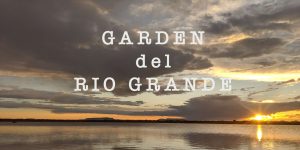
Emilie Trice & LAST/RESORT present Garden del Rio Grande
LAST/RESORT (US)
Garden del Rio Grande pays homage to the geographic region around the Rio Grande River, which runs from central Colorado along the U.S./Mexico border to the Gulf of Mexico. Our garden contemplates how technology can reconnect us to the land and amplify indigenous voices, while questioning to what extent can art and design fortify sustainable ecologies. Through emerging technology we seek to reverse-engineer the past in order to reimagine the future.
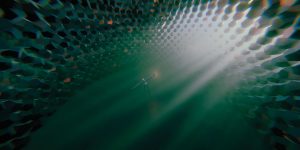
AI x Uncertainty
Jurij Krpan (SL) Speakers: Christl Baur (AT), Suzanne Livingston (UK), Špela Petrič (SL), Stephanie Dinkins (US)
The AIxUncertainty panel focuses on the limitations and uncertainties artists face when developing their work in the frame of AI. What are the challenges for collaboration at the intersection of AI and the arts? What progress can be seen, and where is it failing? What problems do artists face? What frameworks must be created for artists to access their latest research?
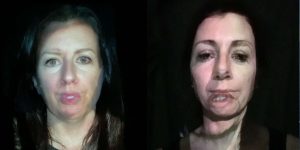
An Atlas of Absence - Online meeting performance
Summer Mei Ling Lee and Laura Boles Faw
Technology was supposed to connect us. The dominant modality for communication and connection during this pandemic era is the digital screen. In this work, collaborators Laura Boles Faw and Summer Mei Ling Lee continue their ongoing series addressing distance and longing that increasingly figures into this heightened moment.
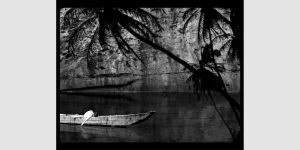
Falling Up Exhibition
re.riddle, California, San Francisco (US)
Amidst riots and racial tensions, divisive political rhetoric and a global pandemic, the past half year has been a time of turbulent uncertainty. These acute ruptures and moments of pain, conflict and unknowingness have inadvertently led to a mode of seeing our former and current realities anew, which may more or less best be described as “surreal”.
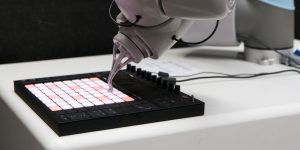
AIxMusic - Artificial Stupidity
Moisés Horta-Valenzuela (MX/US), Artemi-Maria Gioti (GR), Ali Nikrang (AT), Alex Braga (IT) and Portrait XO (US)
The panel on Artificial Stupidity invites artist present at the Ars Electronica Festival to share their experiences in the context of AIxMusic. AI is a media trend right now and a controversial topic.
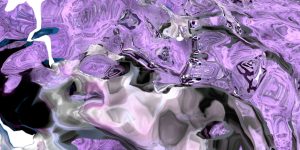
sound:frame & Pausanio virtual – Area for Virtual Art
sound:frame / Eva Fischer (AT), Marijn Bril (NL), Angie Pohl (AT)
sound:frame together with Pausanio presents the Area for Virtual Art – an online platform for digital art and virtual formats. Discover current artistic approaches in virtual exhibitions and meet people in discussion programs and live events to exchange thoughts and create new ideas and concepts. The Area for Virtual Art develops into an international hub, giving a platform to current digital art forms and connecting people all over the world.
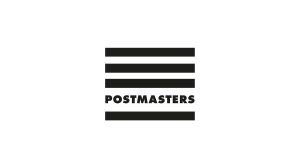
Postmasters presents Nicola Verlato, Donato Piccolo and Kristin Lucas
Paulina Bebecka - Postmasters Gallery, PostmastersROMA, Rome (IT)
In the current uncertain climate of physical disconnection, hyper digital connection and distortion of life as we know it, I wanted to express that humanity is still at the very core of our increasingly technological experience on earth. The chosen artists bring about an examination of reality and the need to cherish our humanity through various digital media, such as artificial intelligence, 3D scanning, 3D gaming software, generative 360 WebXR animation, drones, and techno.

Future from the past: imaginations on the margins
Center for Urban History of East-Central Europe, Lviv, Ukraine (UA)
The Center for Urban History will make video journeys to two places, which are located in rural areas but reflect urban imagination. We will travel to the Center for Space Research and Communication of the National Center for Space Management and Testing of the State Space Agency of Ukraine.

What Type of Crisis is This?
Walter Ötsch (AT)
We invite people from the fields of philosophy, sociology, economics and media studies to take part in a public discussion of these questions. Experts will present their views, challenge each other and offer suggestions for the future of our society.
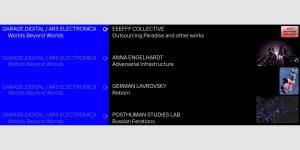
Garage Digital: Worlds beyond Worlds
Garage Museum of Contemporary Art / Nikita Nechaev, Moscow (RU)
Works and practices of several artists and collectives, that participate in Garage Digital program, reflect on the different types of networks, infrastructures, ecologies and algorithms, and pose questions of the possible tactics and strategies to reassemble these systems with new types of communities, modes of rationality and production in mind —cunning, poetic, speculative and emergent.

COVID-19 Crisis: How could/can society change?
Walter Ötsch, Renata Schmidtkunz, Antonia Birnbaum, Evelyn Bodenmeier, Leonhard Dobusch, Sighard Neckel
Walter Ötsch develops two scenarios for the future of society: a positive and a negative one. He will give an overview of the possible ideas for the future, both positive and negative, that were considered in the workshop. Together, obstacles and options for the future are discussed.
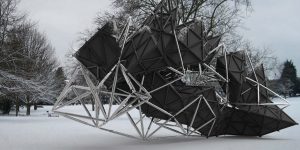
Heterotopias
The Bartlett School of Architecture, University College London (UK)
Roundtable + Q&A - As we collectively detangle our own perceived ‘normal’, how might this shape speculative design and the worlds that come with it? Is Heterotopia an alternative to the utopia/dystopia narrative?

Transformation & Transmission – panel discussion, presentations
A live-streamed presentation of a new selection of works from the exhibition, with live Q&A and panel discussion with the artists. These works range from films, to AR experiences, to hybrid objects, each united by the themes of anxiety, uncertainty, and distance that run through these works. During the festival, we will conduct streamed online tours of the works, show examples, and interview the authors in a live stream hosted every day (times TBC).

re.riddle presents Falling Up
re.riddle, California, San Francisco (US)
re.riddle presents unique programming showcased in site-specific exhibitions and pop-up events worldwide. The itinerant gallery curates socially engaging and multidisciplinary exhibitions of contemporary art. Its mission is to contribute to the discourse on contemporary art in thought provoking and playfully subversive ways. Via new modes of production, reception and consumption, re.riddle places an emphasis on the whimsical, in hopes that art continues to arouse curiosity and promote an awareness of its profound impact on our daily surroundings and lives.

COVID-19 Crisis: What options does civil society and social media have?
Walter Ötsch, Renata Schmidtkunz, Leonhard Dobusch, Evelyn Bodenmeier
We invite people from the fields of philosophy, sociology, economics and media studies to take part in a public discussion. Experts will present their views, challenge each other and offer suggestions for the future of our society.
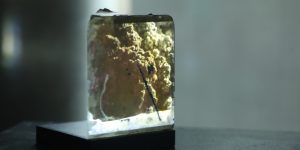
Creative Question Challenge: Can unheard signals inspire change?
Siobhán McDonald (IE), Chris Bean (IE), Adriaan Eeckels (BE)
'Let us finish what we started'. This is how the UN introduces its first Sustainable Development Goal - to end poverty in all forms and dimensions by 2030. The 17 Sustainable Development Goals and their 169 targets have been described as a sprawling, misconceived mess of grandiose intentions. The title of the development agenda itself - 'Transforming our World' - oozes utopian ambition. It was adopted by 193 nations in 2015. Five years later and with ten years left, how do you think our world will transform?

COVID-19 Crisis: Future Scenarios
Walter Ötsch, Renata Schmidtkunz, Sighard Neckel, Antonia Birnbaum
The coronavirus shock will change society and it will not be possible to return to the "normal state of affairs" we had before the crisis. Two scenarios are outlined: (1) In the negative scenario, the coronavirus shock will bring little change on the surface, but will, in fact, fundamentally reshape the political shell that surrounds capitalism. This is explained in analogy to developments after the 2008 financial crisis, in which the elites who caused the crisis were not challenged and held accountable. In this thoroughly realistic scenario, a new authoritarian form of capitalism can emerge, in which the new power for the states is also expanded into new forms of surveillance. (2) The positive scenario ties in with many historical experiences in which the world was improved after crises. We are currently experiencing a redesign of political action that contains positive moments such as new forms of talking collectively about fears, new forms of solidarity with strangers and the experience of how important and powerful politics can be. Perhaps in this scenario it may be possible to combine the corona shock with concerns about the coming ecological crises and to take effective steps to mitigate them.
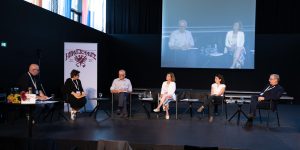
COVID-19 Crisis
Walter Ötsch (AT), Renata Schmidtkunz (AT)
We invite people from the fields of philosophy, sociology, economics and media studies to take part in a public discussion of these questions. Experts will present their views, challenge each other and offer suggestions for the future of our society.
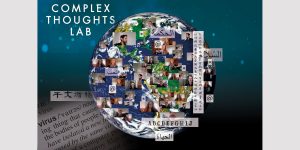
Complex Thoughts Lab
In the post-coronavirus scenario, The Complex Thoughts Lab invites to think outside the box to put together a model of the new world after COVID-19. Are we willing to rethink our nature, the concept of well-being? Will we be able to commit ourselves to bequeath a better world to future generations? The students share ideas to build a world model facing the next generations and transforming the Covid-19 crisis into an opportunity.


